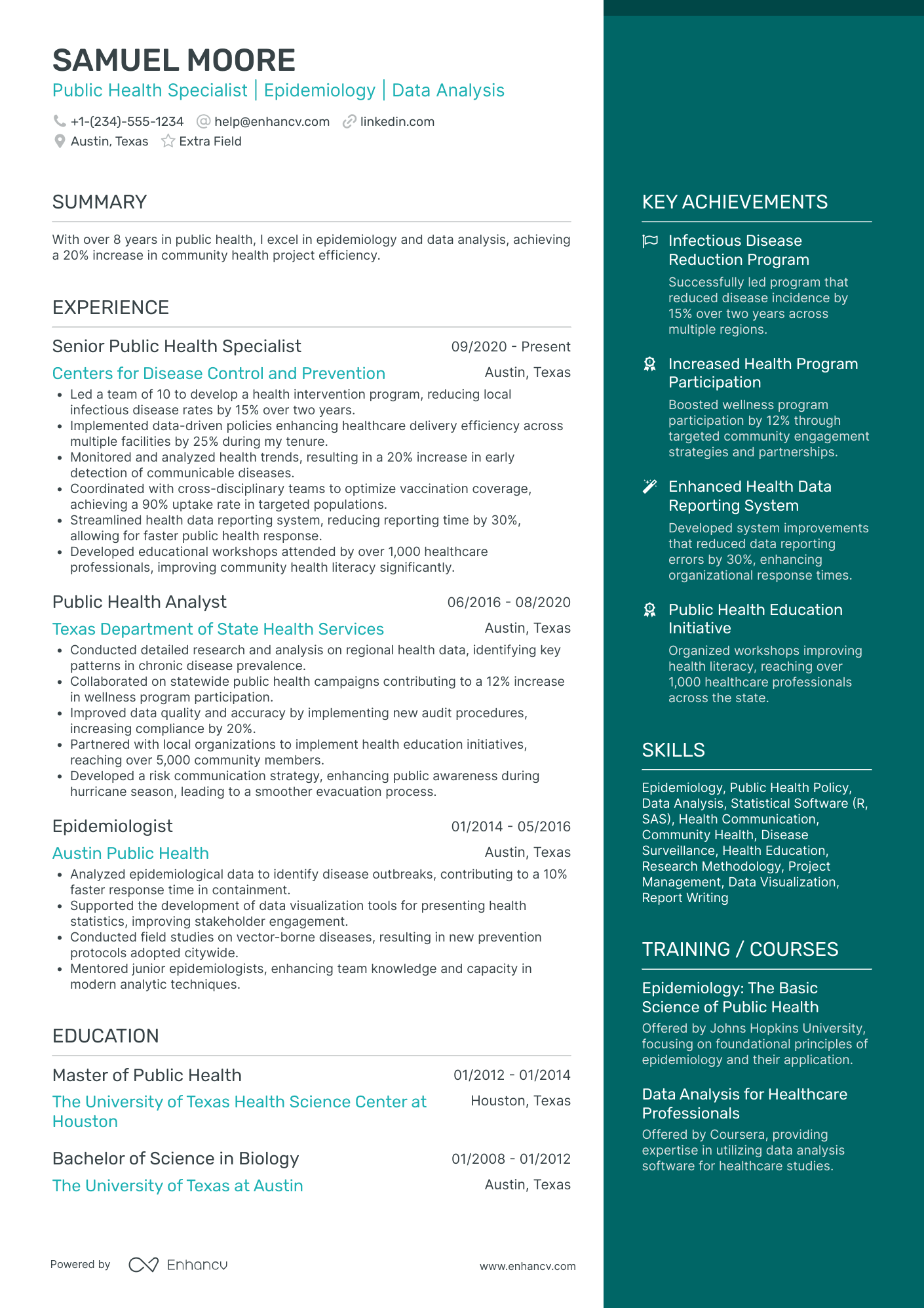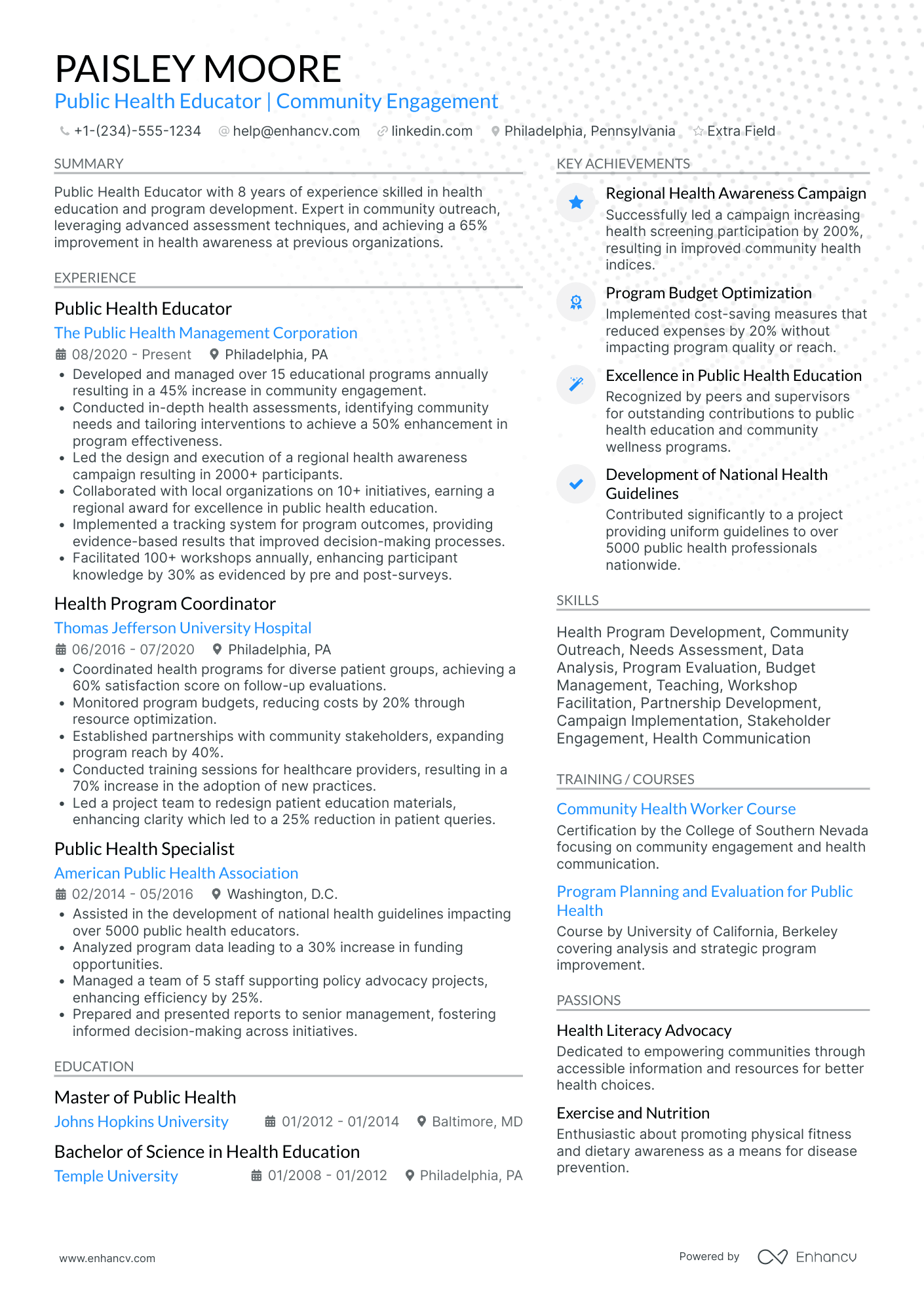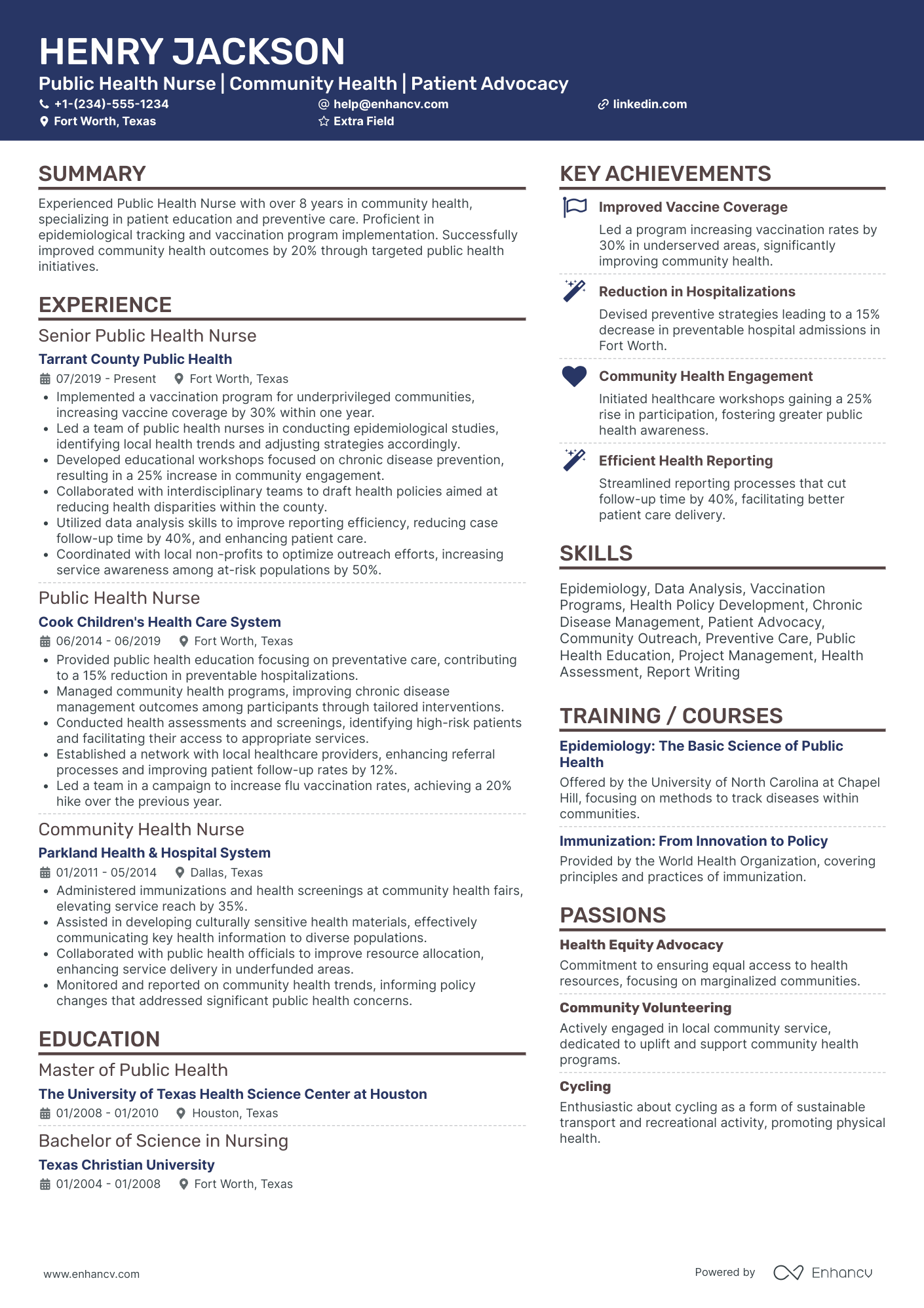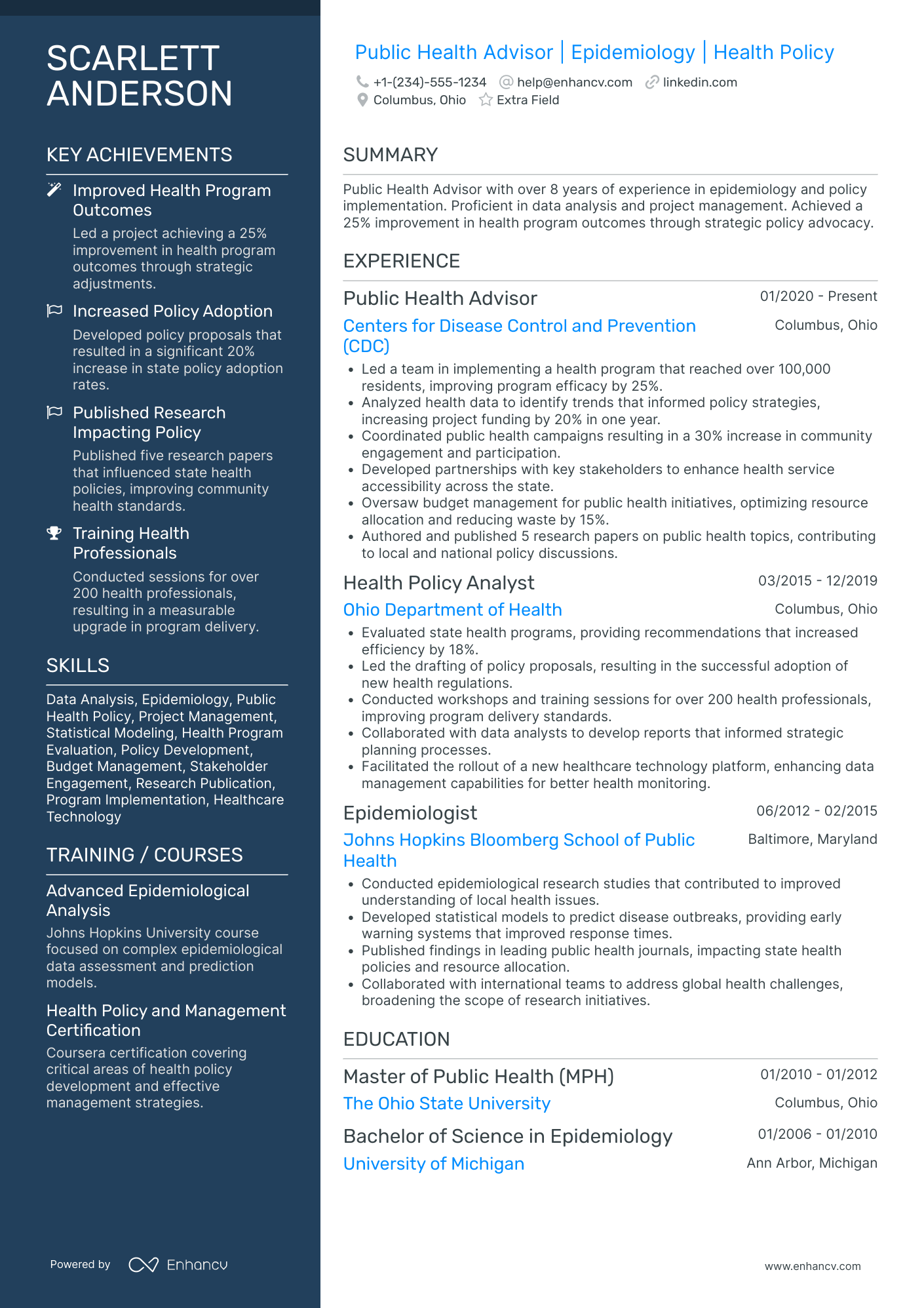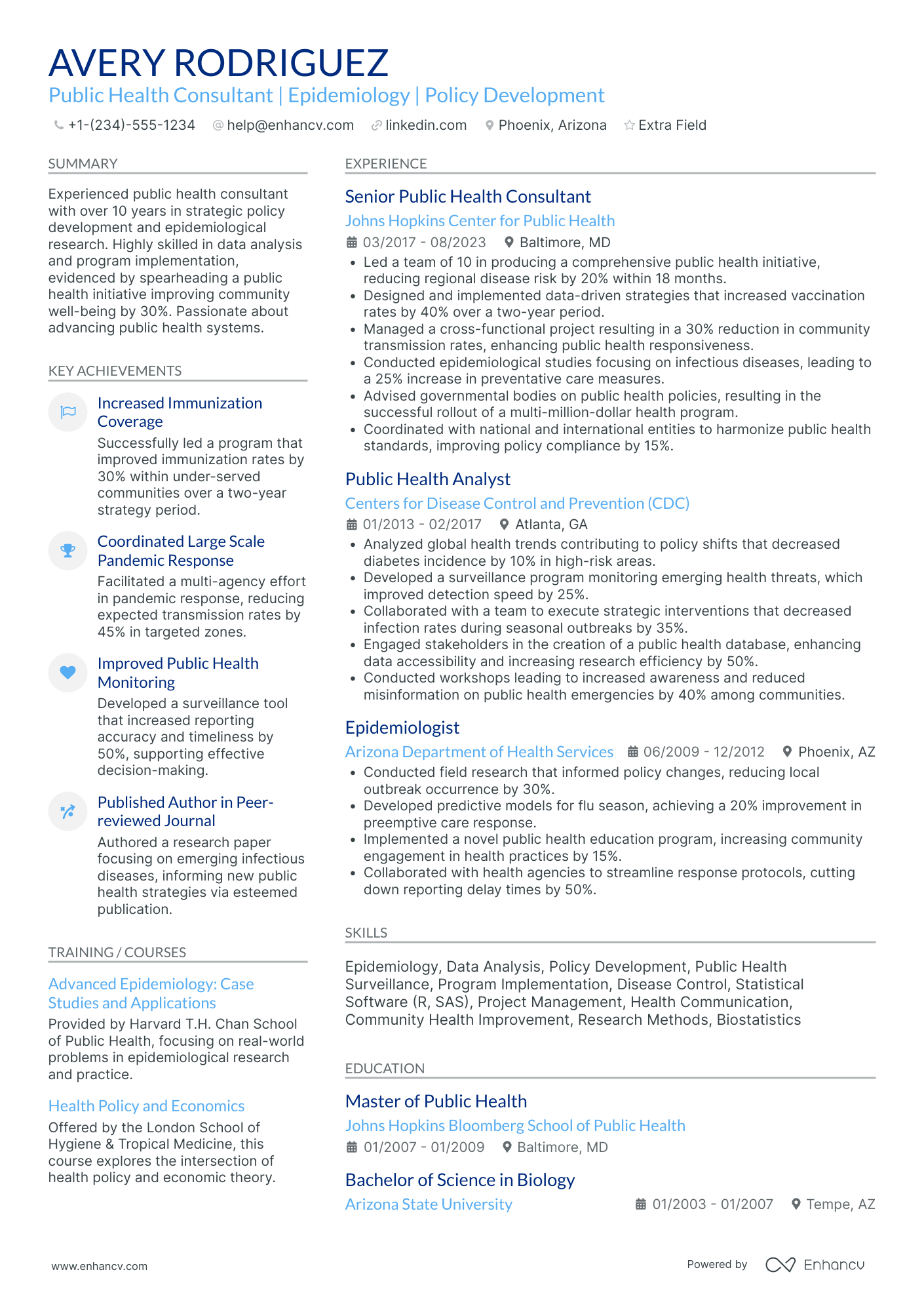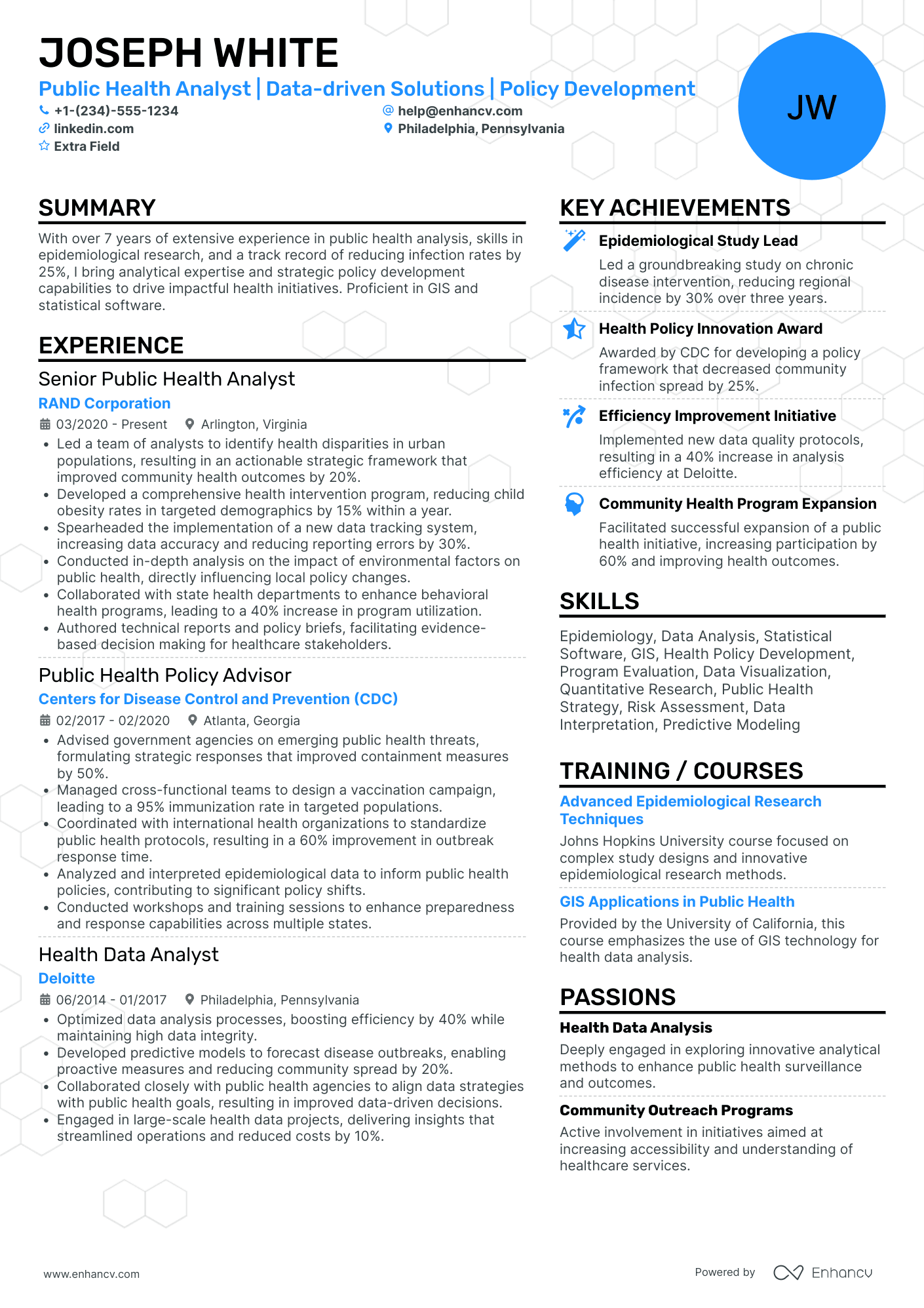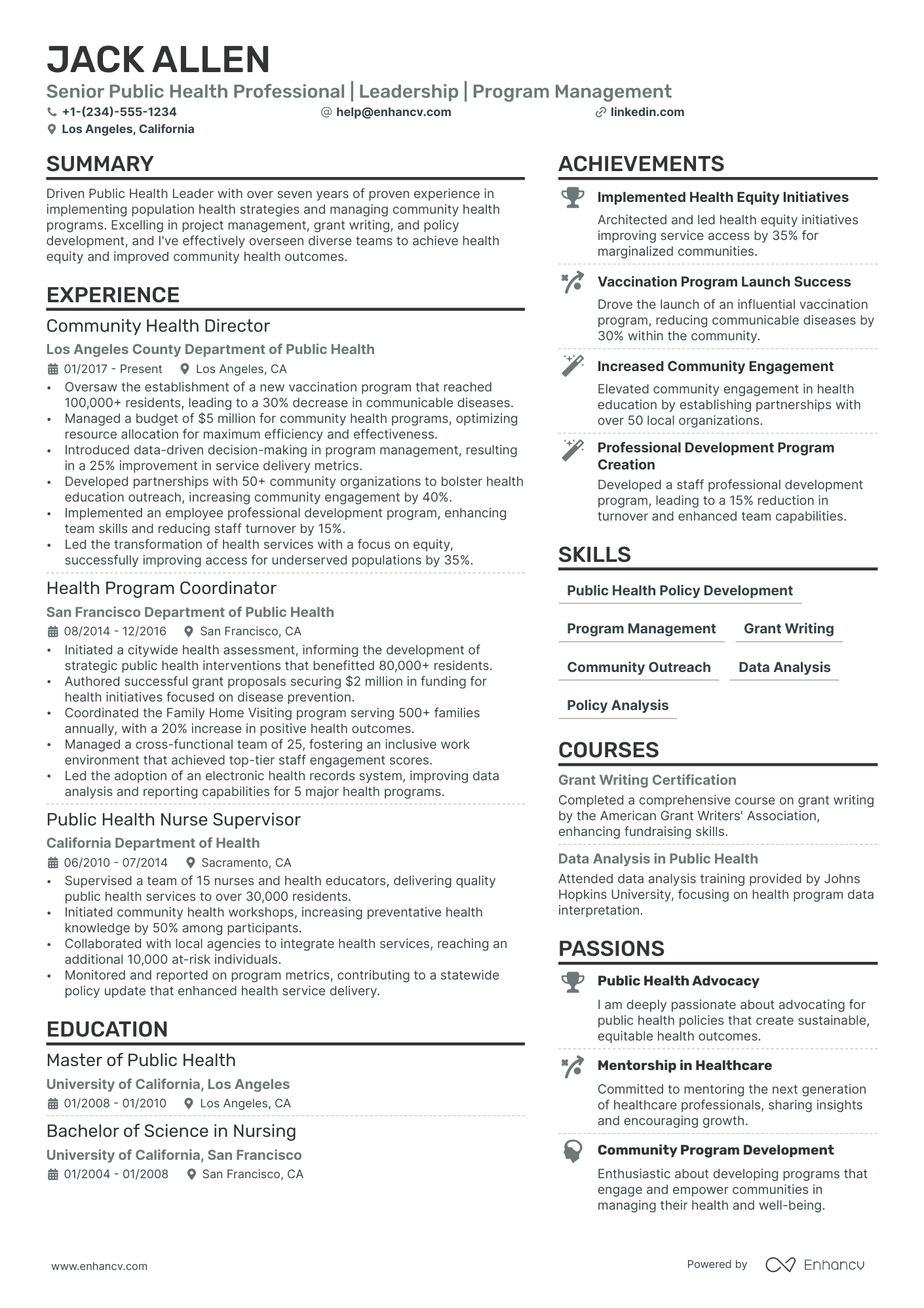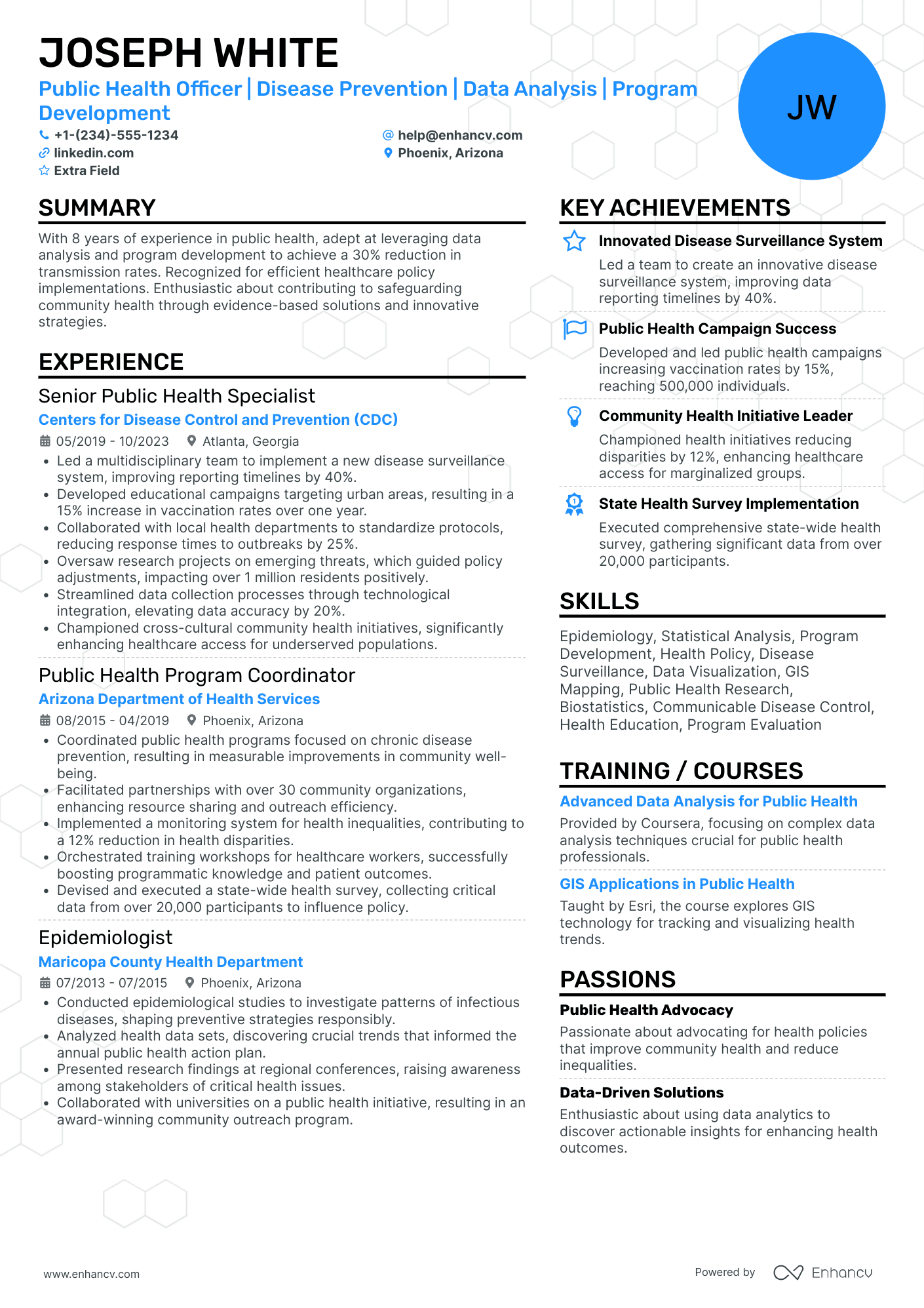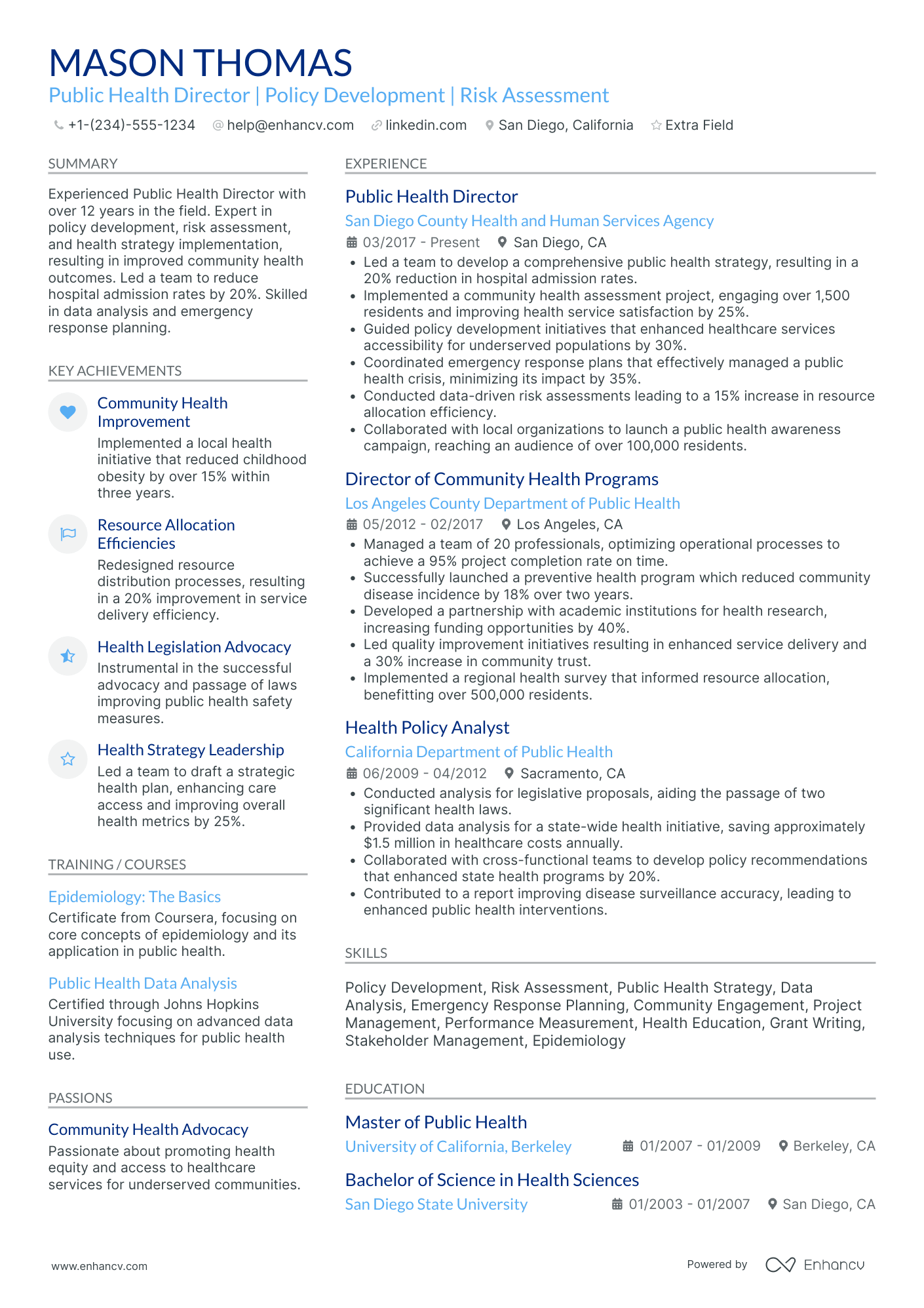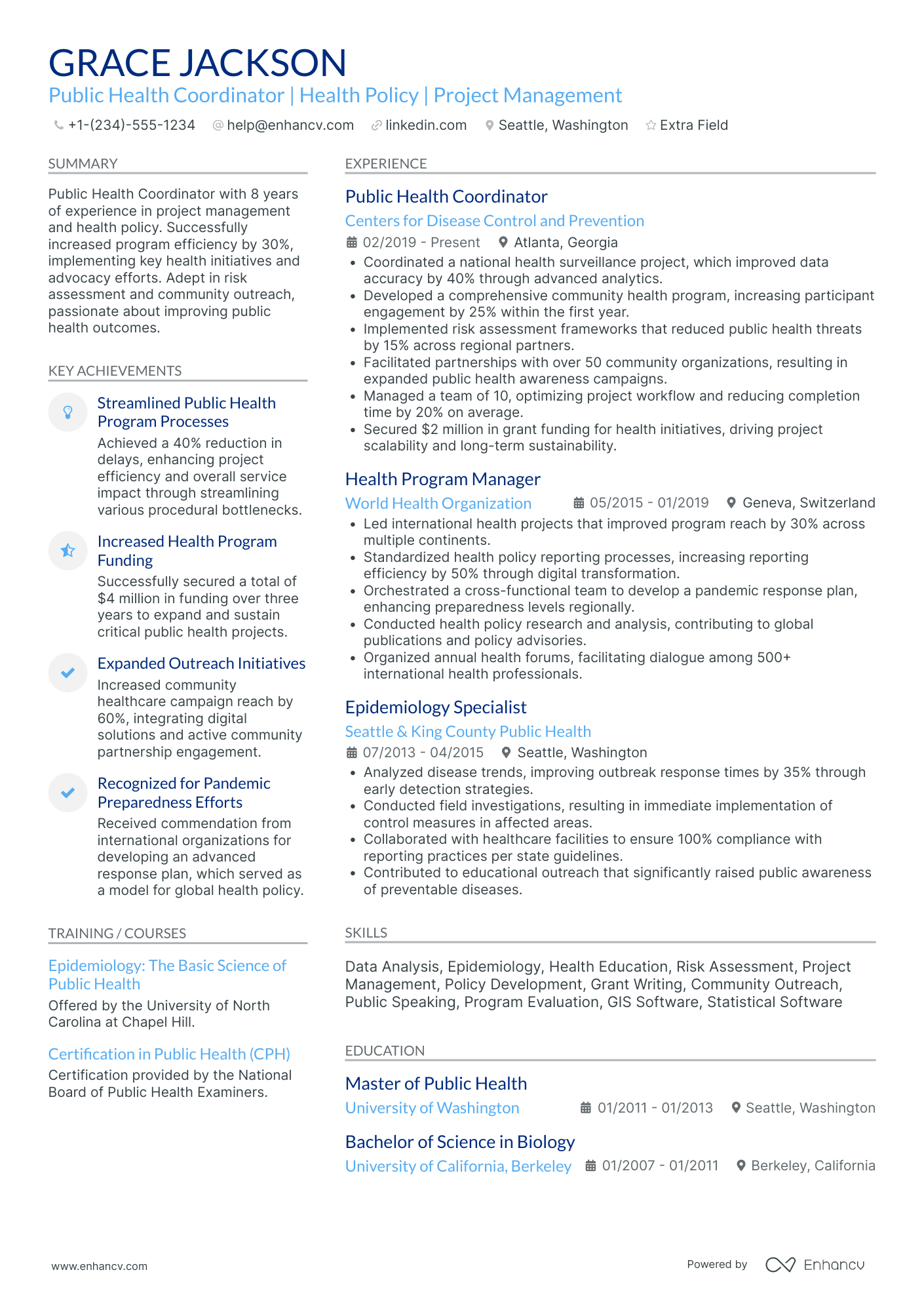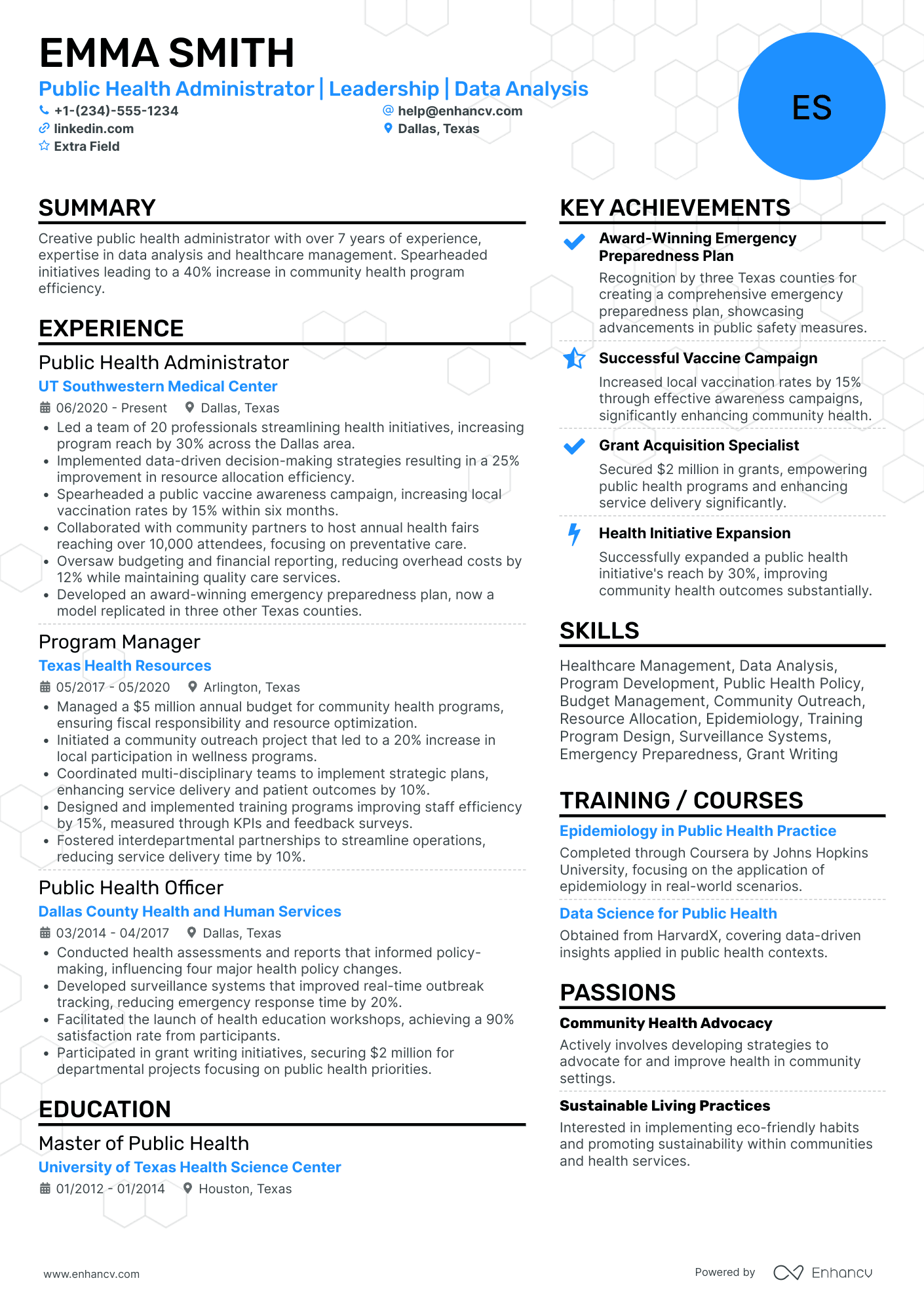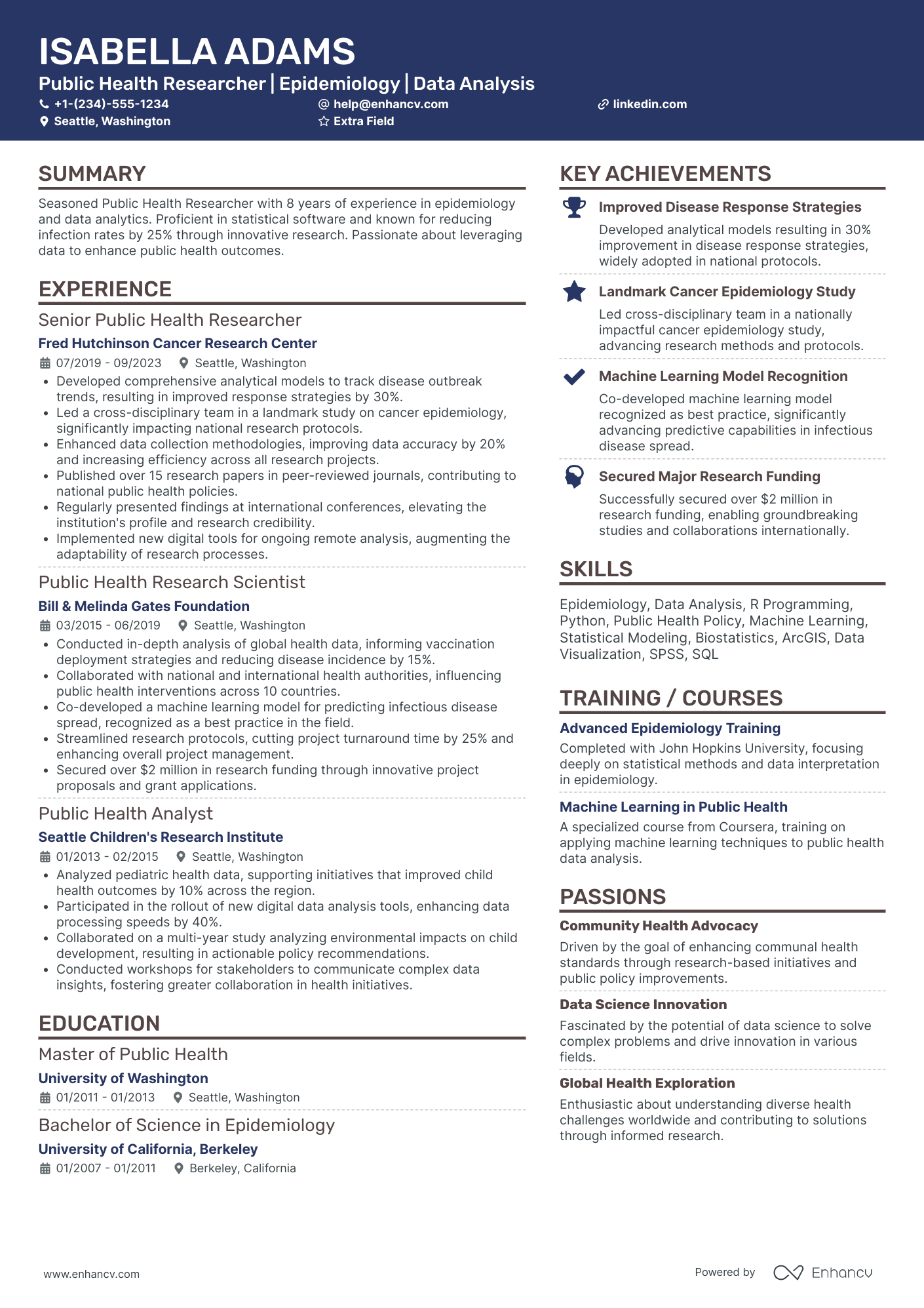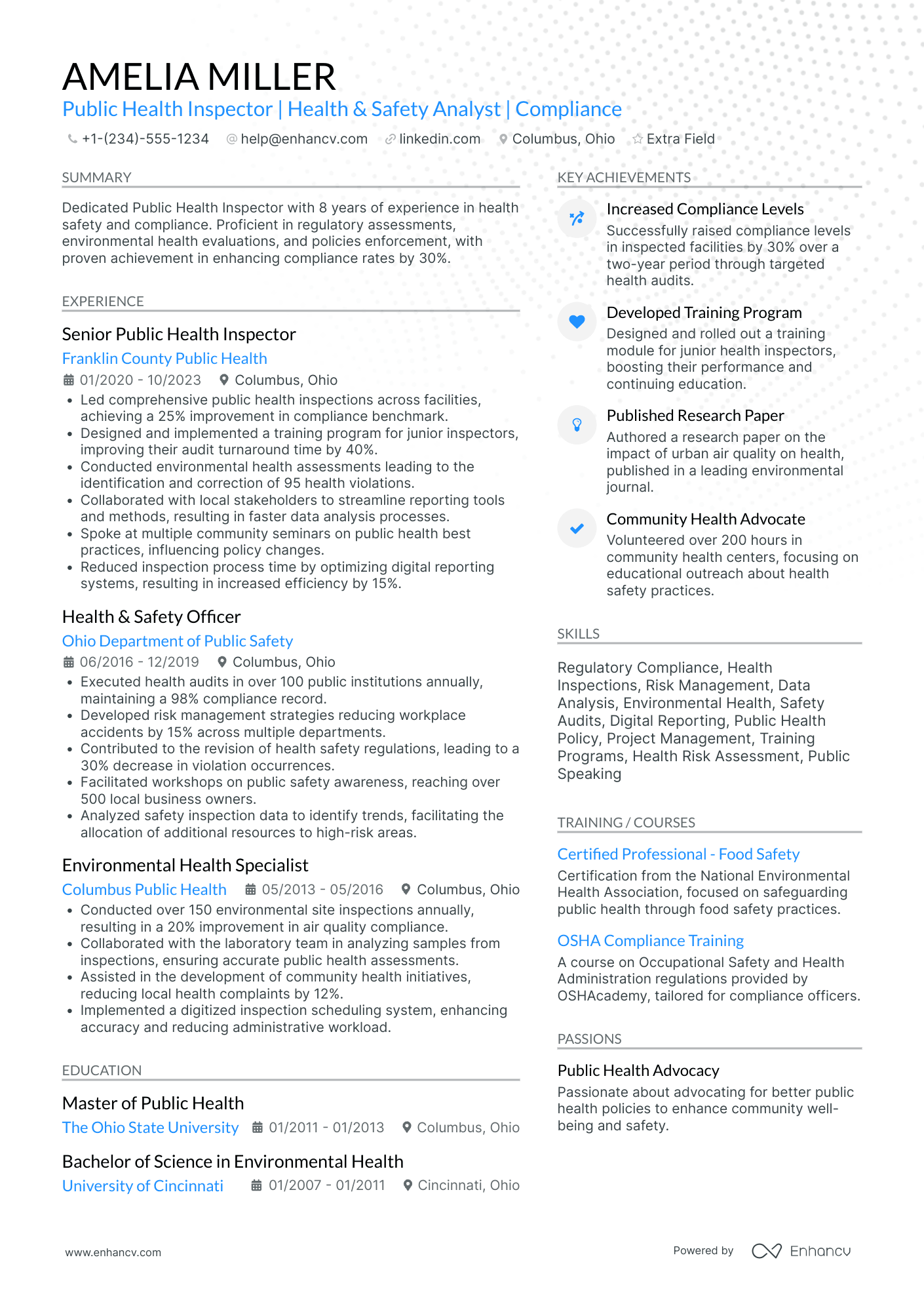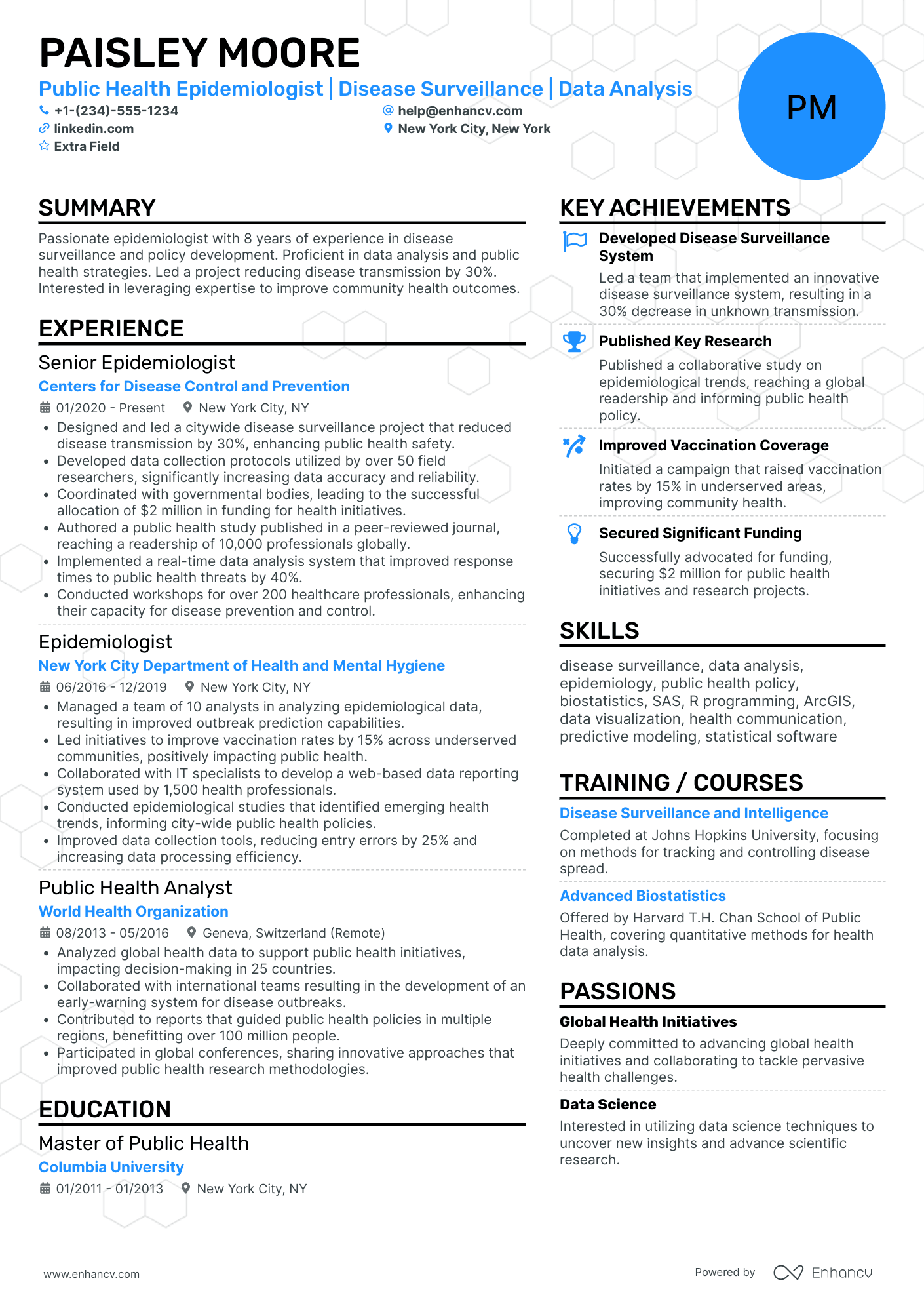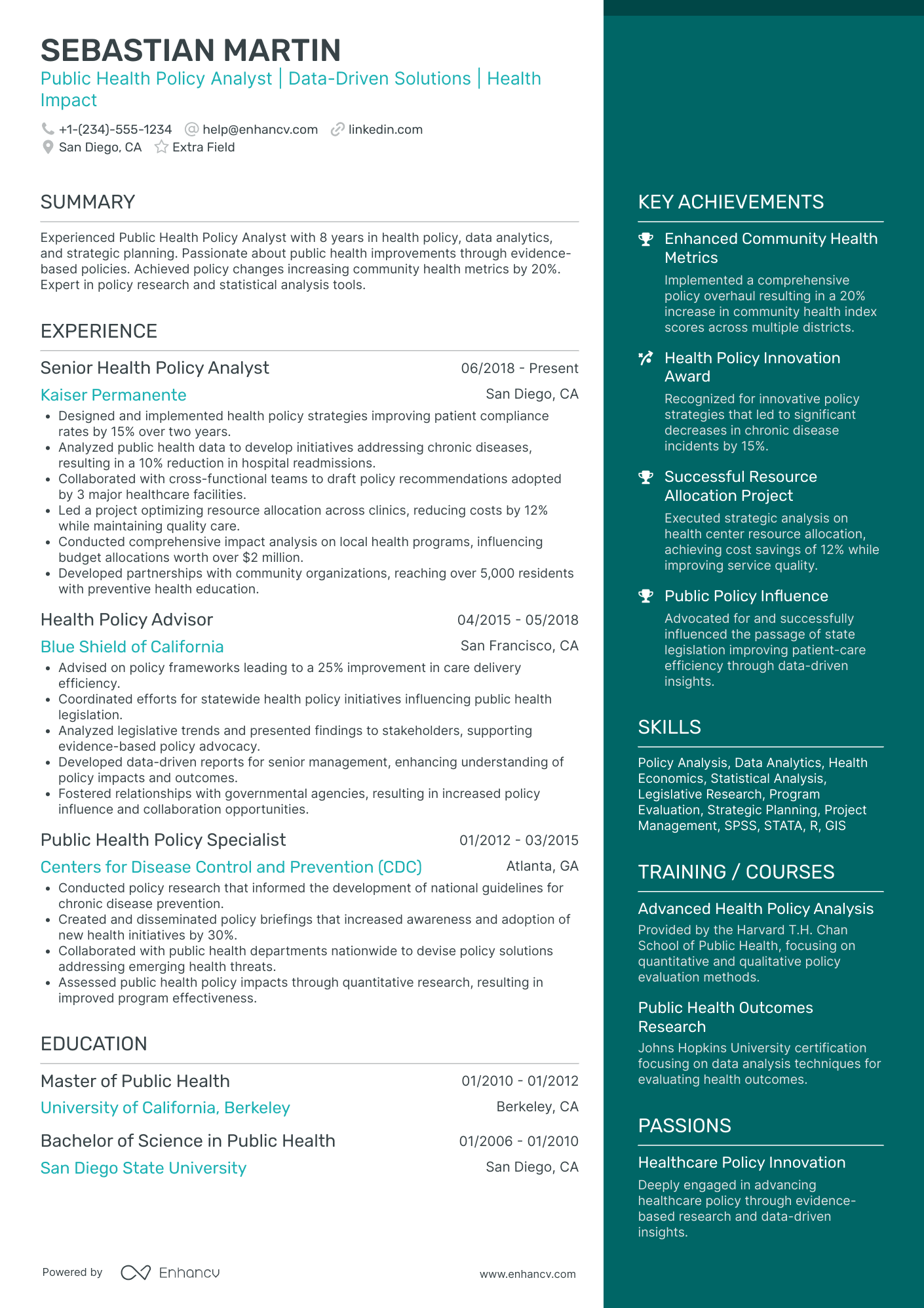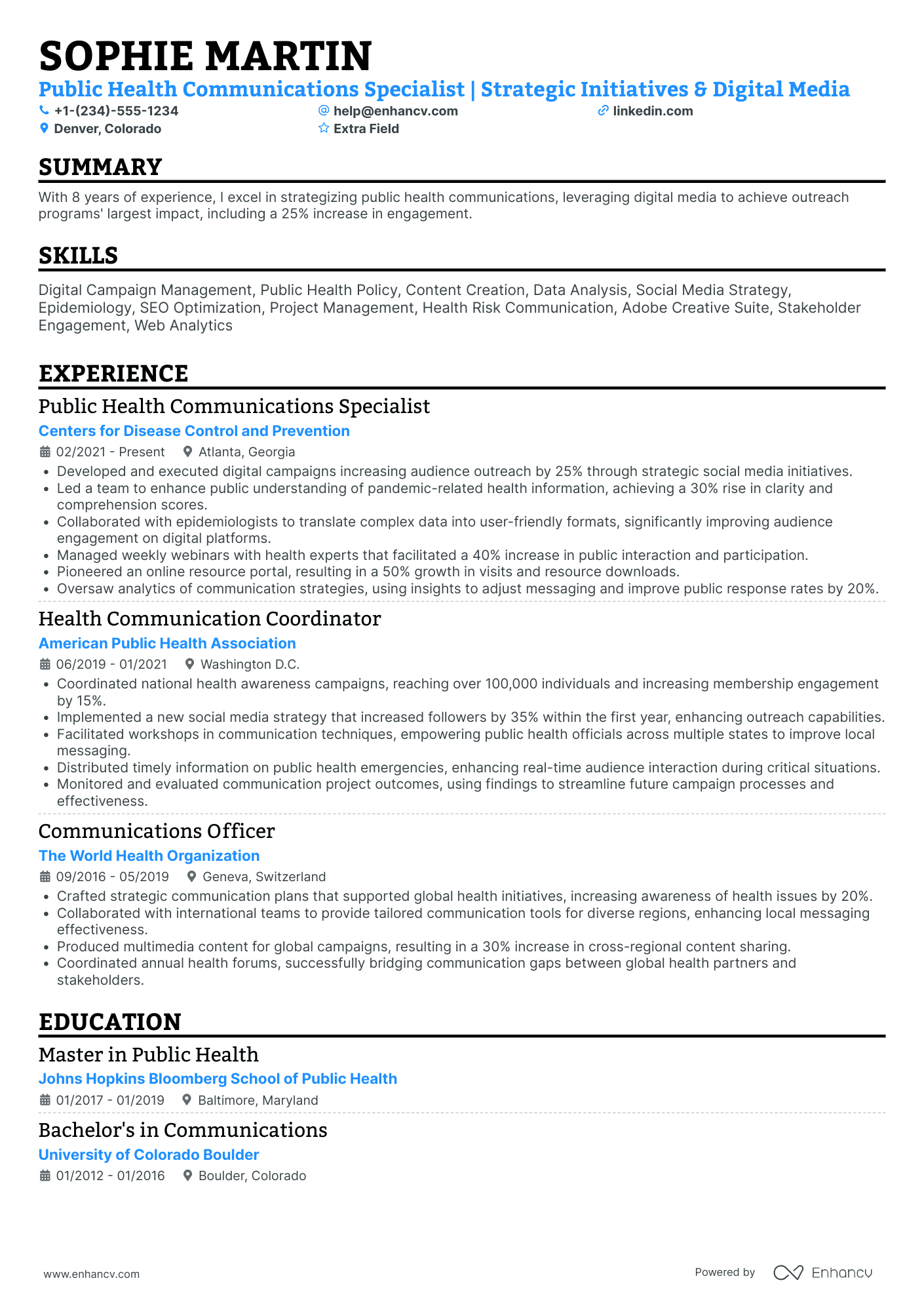Crafting a resume that effectively showcases your public health expertise while standing out in a crowded job market can be challenging. Our guide will provide you with tailored strategies and examples that will help you highlight your unique skills and experiences, ensuring your resume makes a lasting impression on potential employers.
- Find different public health resume examples to serve as inspiration to your professional presentation.
- How to use the summary or objective to highlight your career achievements.
- How to create the experience section to tell your story.
- Must have certificates and what to include in the education section of your resume.
If the public health resume isn't the right one for you, take a look at other related guides we have:
- Ob Gyn Medical Assistant Resume Example
- Massage Therapist Resume Example
- Medical Surgical Nurse Resume Example
- Clinical Nurse Resume Example
- Travel Nurse Resume Example
- CVS Pharmacist Resume Example
- Cardiology Medical Assistant Resume Example
- Hemodialysis Nurse Resume Example
- Social Worker Resume Example
- Staff Nurse Resume Example
Tips and tricks for your public health resume format
Before you start writing your resume, you must first consider its look-and-feel - or resume format . Your professional presentation hence should:
- Follow the reverse-chronological resume format , which incroporates the simple logic of listing your latest experience items first. The reverse-chronological format is the perfect choice for candidates who have plenty of relevant (and recent) experience.
- State your intention from the get-go with a clear and concise headline - making it easy for recruiters to allocate your contact details, check out your portfolio, or discover your latest job title.
- Be precise and simple - your resume should be no more than two pages long, representing your experience and skills that are applicable to the public health job.
- Ensure your layout is intact by submitting it as a PDF. Thus, your resume sections would stay in place, even when assessed by the Applicant Tracker System (ATS).
Think about the location of your application – Canadian resumes, for instance, might follow a different structure.
Upload & Check Your Resume
Drop your resume here or choose a file. PDF & DOCX only. Max 2MB file size.
PRO TIP
Mention specific courses or projects that are pertinent to the job you're applying for.
The five (plus) definite sections your resume for a public health job should include are:
- Header with your headline, contact details, and/or a preview of your work
- Summary (or objective) to pinpoint how your success aligns with the role
- Experience with bullets of your most relevant achievements in the field
- Skills to integrate vital job requirements (both technical and personal)
- Your further dedication to the field, showcased via relevant higher education and/or certifications
What recruiters want to see on your resume:
- Relevant public health Education (e.g., MPH - Master of public health)
- Experience with Epidemiological Research and Data Analysis
- Knowledge of public health Policies and Legislation
- Proficiency in public health Education and Promotion
- Demonstrated Skill in Program Planning, Implementation, and Evaluation
Guide to your most impressive public health resume experience section
When it comes to your resume experience , stick to these simple, yet effective five steps:
- Show how your experience is relevant by including your responsibility, skill used, and outcome/-s;
- Use individual bullets to answer how your experience aligns with the job requirements;
- Think of a way to demonstrate the tangible results of your success with stats, numbers, and/or percentages ;
- Always tailor the experience section to the public health role you're applying for - this may sometimes include taking out irrelevant experience items;
- Highlight your best (and most relevant) achievements towards the top of each experience bullet.
You're not alone if you're struggling with curating your experience section. That's why we've prepared some professional, real-life public health resume samples to show how to best write your experience section (and more).
- Led a team to implement a community-based health intervention program, increasing local health screenings by 40% within the first year.
- Developed partnerships with 5 local schools to facilitate health education workshops, reaching over 1,000 students on topics such as nutrition and physical activity.
- Managed a budget of $200,000 for public health programs, optimizing resource allocation and reducing unnecessary expenditures by 15%.
- Conducted research on health disparities affecting minority communities, resulting in publication of 3 papers in peer-reviewed journals.
- Coordinated the response to a local Hepatitis C outbreak, overseeing a team of 20 healthcare professionals and successfully reducing transmission rates by 30%.
- Implemented an electronic health record system across 10 community health centers, enhancing efficiency and patient data management.
- Spearheaded a digital campaign on preventive health measures during the COVID-19 pandemic, reaching over 2 million people through social media platforms.
- Evaluated and improved existing health surveillance systems, leading to a 25% increase in accuracy and timeliness of infectious disease reporting.
- Facilitated cross-sector collaboration between public health and environmental organizations to address climate change impacts on public health.
- Collaborated with local governments in sub-Saharan Africa to develop and roll out malaria prevention programs, reducing malaria incidence by 35% over five years.
- Oversaw the distribution of 500,000 insecticide-treated mosquito nets and the training of community health workers.
- Negotiated with pharmaceutical companies to lower prices for antimalarial drugs, making treatment more accessible to underprivileged communities.
- Pioneered a public health informatics program which leveraged data analysis to predict and respond to flu outbreaks, aiding in the immunization of 50,000 individuals annually.
- Published a comprehensive report on local health trends which influenced policy decisions and public health initiatives within the community.
- Organized quarterly public health forums inviting experts to discuss ongoing health challenges and solutions, enhancing community engagement.
- Designed and led a successful public health campaign that educated more than 25,000 teens on the risks of vaping and tobacco use.
- Analyzed data from health surveys to identify risk factors prevalent in the community and created targeted intervention strategies.
- Cultivated strategic alliances with local nonprofits to enhance resource sharing and expand the reach of health initiatives.
- Established a public health emergency preparedness plan that became a model for other municipalities, enhancing readiness for potential health crises.
- Managed a team that conducted over 300 health inspections annually, ensuring compliance with local and state health regulations.
- Engaged in grant writing efforts that secured $1.2 million in funding for health promotion and disease prevention programs.
- Orchestrated a public awareness campaign on heart health that contributed to a 10% decline in the regional mortality rate from cardiac diseases.
- Collaborated with university researchers to analyze the impact of dietary habits on public health, influencing local policy on food labeling and advertising.
- Initiated a neighborhood fitness challenge which engaged over 500 residents and advocated for the development of additional recreational spaces.
Quantifying impact on your resume
- Include the percentage reduction in disease incidence achieved through your public health initiatives to demonstrate efficacious program implementation.
- Specify the number of people educated or vaccinated in public health campaigns to showcase your outreach capabilities.
- Present the amount of grant money secured for public health projects to illustrate your proficiency in acquiring financial resources.
- List the quantitative improvements in health outcomes, such as reduced mortality rates, associated with your interventions to prove your impact on public health.
- Mention the turnaround time for emergency public health response measures to show your ability to react swiftly in crisis situations.
- Quantify the scale of public health studies conducted, by the number of participants enrolled, to reflect your experience in managing extensive research.
- State the numerical growth in community engagement or program participation to convey your success in promoting public health awareness.
- Detail the cost savings accomplished through preventive care measures or more efficient health service delivery to emphasize your strategic financial planning skill.
Action verbs for your public health resume
Experience section for candidates with zero-to-none experience
While you may have less professional experience in the field, that doesn't mean you should leave this section of your resume empty or blank.
Consider these four strategies on how to substitute the lack of experience with:
- Volunteer roles - as part of the community, you've probably gained valuable people (and sometimes even technological capabilities) that could answer the job requirements
- Research projects - while in your university days, you may have been part of some cutting-edge project to benefit the field. Curate this within your experience section as a substitute for real-world experience
- Internships - while you may consider that that summer internship in New York was solely mandatory to your degree, make sure to include it as part of your experience, if it's relevant to the role
- Irrelevant previous jobs - instead of detailing the technologies you've learned, think about the transferable skills you've gained.
Recommended reads:
PRO TIP
Highlight any significant extracurricular activities that demonstrate valuable skills or leadership.
Defining your unique public health skill set with hard skills and soft skills
In any job advertisement, a blend of specific technologies and interpersonal communication skills is typically sought after. Hard skills represent your technical expertise and indicate your job performance capacity. Soft skills, on the other hand, demonstrate how well you would integrate within the company culture.
Incorporating a balanced mix of both skill types in your public health resume is crucial. Here's how you can do it:
- In your resume summary or objective, incorporate up to three hard and/or soft skills. Make sure to quantify these skills with relevant or impressive achievements; less
- The skills section should list your technical know-how.
- The strengths section is an ideal place to quantify your competencies by focusing on the achievements facilitated by these skills.
Top skills for your public health resume:
Epidemiology
Biostatistics
Health Informatics
GIS Mapping
Data Analysis Software (e.g., SAS, SPSS)
Public Health Surveillance Systems
Health Policy Analysis
Community Health Assessment Tools
Statistical Modeling
Survey Design Tools
Communication
Critical Thinking
Problem-Solving
Collaboration
Leadership
Cultural Competency
Adaptability
Empathy
Time Management
Attention to Detail
PRO TIP
If you failed to obtain one of the certificates, as listed in the requirements, but decide to include it on your resume, make sure to include a note somewhere that you have the "relevant training, but are planning to re-take the exams". Support this statement with the actual date you're planning to be re-examined. Always be honest on your resume.
Showcase academic background with education and certifications' sections
Listing your education and certifications should be a rudimentary part of your resume writing.
Including your relevant academic background - in the form of your higher education degree and niche-specific certificates - will prove knowledge of the industry.
For your education section:
- Start by including your degree, followed by start and graduation dates, as well as the institution;
- You could include relevant coursework, major/minor , or GPA, only if your've just graduated from college or if this information would further support your application;
- If you have an "ongoing" degree, you can still list it in case you think your diploma can impress recruiters or it's required;
Follow a similar logic for your certifications section by listing the institution, alongside dates you've obtained the certificate. For some of the most recent and relevant industry certificates , check out the next part of our guide:
The top 5 certifications for your public health resume:
- Certified in public health (CPH) – National Board of public health Examiners (NBPHE)
- Master Certified Health Education Specialist (MCHES) – National Commission for Health Education Credentialing (NCHEC)
- Certified Health Education Specialist (CHES) – National Commission for Health Education Credentialing (NCHEC)
- Registered Environmental Health Specialist/Registered Sanitarian (REHS/RS) – National Environmental Health Association (NEHA)
- Certified in Infection Control (CIC) – Certification Board of Infection Control and Epidemiology (CBIC)
PRO TIP
Bold the names of educational institutions and certifying bodies for emphasis.
Recommended reads:
Professional summary or objective for your public health resume
public health candidates sometimes get confused between the difference of a resume summary and a resume objective.
Which one should you be using?
Remember that the:
- Resume objective has more to do with your dreams and goals for your career. Within it, you have the opportunity to showcase to recruiters why your application is an important one and, at the same time, help them imagine what your impact on the role, team, and company would be.
- Resume summary should recount key achievements, tailored for the role, through your career. Allowing recruiters to quickly scan and understand the breadth of your public health expertise.
The resume objectives are always an excellent choice for candidates starting off their career, while the resume summary is more fitting for experienced candidates.
No matter if you chose a summary or objective, get some extra inspiration from real-world professional public health resumes:
Resume summaries for a public health job
- With over 8 years of field experience and a Ph.D. in public health, I have successfully designed and implemented community health initiatives that reduced the incidence of communicable diseases by 30% in urban areas. Expertise in epidemiological research and a passion for health education drive my continual pursuit of excellence.
- Dedicated Health Educator with more than 10 years of experience in designing engaging wellness programs that increased regular health screenings by 25%. Specializes in preventative healthcare, adept in statistical analysis, and committed to fostering sustainable health practices.
- Transitioning from a 7-year career in clinical nursing to public health, I am equipped with acute patient care skills, comprehensive knowledge of healthcare systems, and a profound ability to manage large-scale health projects. Eager to apply a unique perspective to epidemiology and disease prevention strategies.
- Seasoned marketing professional with over 12 years at a Fortune 500 company looking to leverage extensive background in data analysis, behavior change campaigns, and strategic planning into the public health sector, aiming to contribute to impactful health promotion and disease prevention programs.
- Seeking to initiate a career in public health with a focus on combating health disparities. Bringing forward a deep-seated commitment to community service, a Bachelor's degree in Biology, and rigorous research skills honed through university-led projects on infectious disease control. Eager to learn and make a tangible impact.
- Aspiring to contribute to public health research and advocacy; bringing a strong foundation in global health issues gained through my recent Master's in public health. No direct experience in the field but equipped with analytical prowess and dedication to evidence-based approaches to health improvement for marginalized populations.
Optimize your resume summary and objective for ATS
Drop your resume here or choose a file.
PDF & DOCX only. Max 2MB file size.
Extra public health resume sections and elements
Creating a winning public health resume isn't about following a rigid formula. The key is to tailor it to the job requirements while maintaining your unique personality.
Consider including these additional resume sections to enhance your profile:
- Awards - Highlight industry-specific awards as well as any personal accolades to demonstrate recognition of your expertise and achievements;
- Hobbies and interests - Share your interests outside of work. This can provide insights into your personality and indicate whether you'd be a good cultural fit for the organization;
- Projects - Detail significant projects you've been involved in, focusing on your contributions and the outcomes;
- Publications - If you've authored or co-authored academic papers or other publications, include them to establish your credibility and in-depth knowledge of the field.
These sections can give a more comprehensive view of your capabilities and character, complementing the standard resume content.
Key takeaways
At the end of our guide, we'd like to remind you to:
- Invest in a simple, modern resume design that is ATS friendly and keeps your experience organized and legible;
- Avoid just listing your responsibilities in your experience section, but rather focus on quantifiable achievements;
- Always select resume sections that are relevant to the role and can answer job requirements. Sometimes your volunteering experience could bring more value than irrelevant work experience;
- Balance your technical background with your personality traits across various sections of your resume to hint at how much time employers would have to invest in training you and if your profile would be a good cultural fit to the organization;
- Include your academic background (in the form of your relevant higher education degrees and certifications) to show recruiters that you have the technical basics of the industry covered.
Public Health resume examples
By Role
